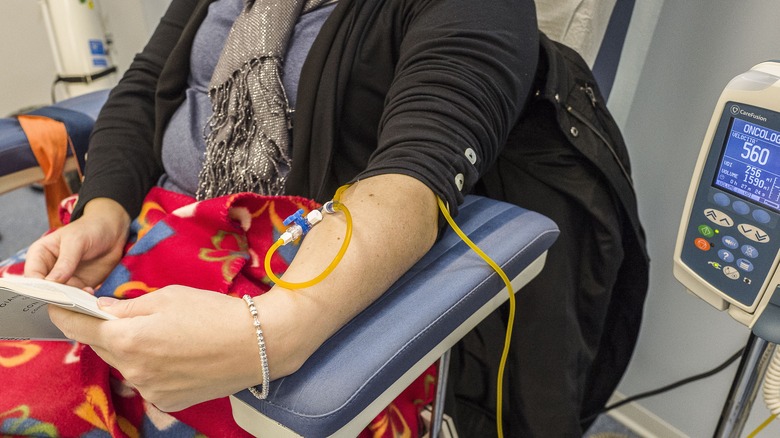Research Shows Lack Of Concern For Female Sexual Health After Cancer Treatment
According to the American Cancer Society, cancer treatments affect the physical and psychological aspects of sexual health. In some cases, this means a lowered libido, body image issues, or depression symptoms, while in other cases, sexual function is disrupted. When it comes to those with genitourinary cancers, these sexual side effects can be amplified, because these cancers involve the reproductive organs and the urinary system.
But, despite this, a new study found that women with genitourinary cancers aren't being asked about their sexual health by their doctors as often as men. In fact, only one in 10 women are asked about this topic, compared to nine in 10 men — a discouraging number for women who undergo treatment for cancer.
Although it's well known in the oncology community that cancer treatments negatively affect sexual health in patients, the results of the study, which will be presented at the American Society for Radiation Oncology (ASTRO) Annual Meeting, hope to shed light on the disparities in these conversations, especially since 90% of women experience some form of sexual dysfunction during and after cancer treatment. In contrast, only 50% of men report the same. "I think that all oncologists should ask about women's sexual function after any diagnosis of gynecological cancers, and I hope papers like this one will encourage that process," co-director of Yale Medicine's Sexual Intimacy & Menopause Program Dr. Mary Jane Minkin told Healthline.
While the results of the study are clear, researchers can only hypothesize as to why this is happening.
Women's sexual health is still taboo
Whether it's cancer treatment-related or not, the discussion about women's sexual health is still a taboo subject. The reasons for this vary from cultural differences to sexism to gender roles to policies surrounding women's sexual and reproductive health (via Irish Global Health Network). However, not talking about something doesn't make it go away. Instead, it contributes to the taboo and negatively impacts the health of women.
The Department of Radiation Oncology at the University of Michigan conducted an 11-year study in which they evaluated people for brachytherapy, a type of internal radiation, for their prostate and cervical cancer. Their study of 201 people found similar results to the new study, with 89% of men and only 13% of women having been asked about and/or counseled about their sexual health (via Science Direct). Considering there are 13,000 new cases of cervical cancer every year, according to the Center for Disease Control, those are heartbreaking figures. A previous study by the same Department of Radiation Oncology found that "79% of women believed that sexual function was an important component of their overall health."
It seems doctors, although they should be comfortable talking about all aspects of the human body, still struggle to discuss sexual health with their female patients.
There are more treatment options for men
In addition to the taboo factor, researchers believe the fact that there are more treatment options for men than women in remedying sexual health issues could also play a role in why women aren't being asked the right questions. "It's easy for us to prescribe different medications for our male patients, but for our female patients, we don't have that first step. I think that creates a barrier to bringing these issues up," says the press release.
But one of the reasons why there are more medications for men is because sexual dysfunction in women isn't studied enough (via Mayo Clinic Proceedings). It's easy to have treatment options like Viagra and Cialis for erectile dysfunction (ED) when such work is funded and male researchers execute the studies. Case in point: ResearchGate found that for every study done on PMS, there are five studies done on ED, despite the fact ED affects only 19% of men while an estimated 75% of women have experienced a range of PMS symptoms.
Women, like men, are sexual beings. Even when they're in the throes of cancer treatment, it doesn't mean that the longing to feel sexual intimacy should be ignored. "Most cervical cancer survivors do quite well with hormonal therapy, adding vaginal therapy for local pain," Dr. Minkin told Healthline. "As this study pointed out, all you need to do is ask the patient how she is doing."
And should your doctor not inquire about your sexual health, it's important to advocate for yourself and speak up.


